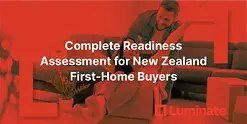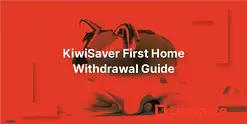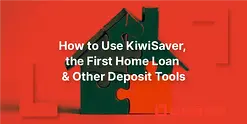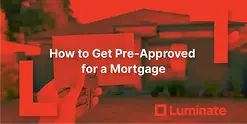Home Loan Documents Checklist for NZ Buyers – 2025 Guide
 By
Trent Bradley
·
15 minute read
By
Trent Bradley
·
15 minute read
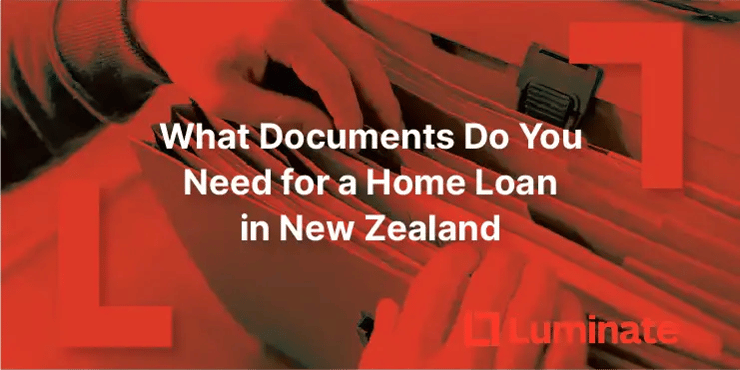
Applying for a home loan can feel like a big task, especially if you've never done it before. You've saved your deposit, you've got your eye on a property, and now you're ready to talk to a lender. But before any bank or lender can give you a formal approval, they need to understand your full financial picture.
Table of Contents
- Why Lenders Need Documentation: Understanding the Process
- Complete Home Loan Document Checklist for New Zealand
- 1. Proof of Identity and Address Verification
- 2. Income Verification Documents
- 3. Bank Statements and Transaction History
- 4. Credit Card, Loan, and Debt Statements
- 5. Deposit and Savings Evidence
- 6. Living Expenses and Budget Breakdown
- 7. Property-Specific Documents (Once You Find a Home)
- 8. Additional Documents for Specific Situations
- How Luminate Financial Group Makes Documentation Easy
- Frequently Asked Questions About Home Loan Documents
- Final Thoughts: Be Prepared, Be Confident
Key Takeaways
- Lenders require comprehensive documentation to assess identity, income, debts, savings, and expenses—being prepared speeds up approval from weeks to just days.
- Essential documents for everyone include photo ID, proof of address, 3 months of bank statements, payslips or financial statements, and evidence of your deposit source.
- Self-employed borrowers need 2 years of financial statements and tax returns—this is non-negotiable for most lenders and requires advance planning with your accountant.
- Your bank statements reveal more than transactions—lenders scrutinize them for gambling, frequent overdrafts, and spending patterns, so maintain 3-6 months of clean banking history before applying.
- Credit cards are assessed based on their limit, not balance—a $10,000 limit card can reduce your borrowing capacity by $55,000-$75,000 even if you pay it off monthly.
- Property-specific documents (Sale & Purchase Agreement, LIM report, building inspection, valuation) are needed once you find a home and can take 1-2 weeks to obtain.
- Working with a mortgage adviser streamlines the entire documentation process—they review everything before submission, handle lender communication, and identify issues early to prevent delays.
At Luminate Financial Group, we help hundreds of first-home buyers through this process every year. One of the first things we help our clients do is get their documentation in order. Having the right documents ready from the start can speed up your loan approval, reduce stress, and give you a real advantage when the right property comes along.
In this comprehensive guide, we'll walk you through exactly what documents you need for a mortgage application in New Zealand, why each one matters, and how to prepare them efficiently.
Why Lenders Need Documentation: Understanding the Process
Banks don't just hand out home loans based on income alone. They need to assess your overall financial position, your ability to repay the loan, and your stability. This process is governed by the Credit Contracts and Consumer Finance Act (CCCFA) and Responsible Lending Code, which require lenders to make reasonable inquiries about your financial situation.
What Lenders Are Assessing
When reviewing your documentation, lenders evaluate:
| Assessment Area | What They're Looking For | Why It Matters |
|---|---|---|
| Identity | You are who you say you are | AML/KYC legal requirements |
| Income | Sufficient, stable, and ongoing income | Ability to make repayments |
| Employment | Job security and length of service | Income reliability |
| Expenses | Realistic living costs and spending habits | Affordability assessment |
| Debts | Existing financial commitments | Impact on serviceability |
| Savings | Genuine deposit and savings pattern | Financial discipline |
| Credit history | Past borrowing behavior | Risk assessment |
| Assets | What you own | Overall financial position |
The Benefits of Being Document-Ready
Why preparation matters:
- Faster approval: Complete applications process in days instead of weeks
- Competitive advantage: Act quickly when you find the right property
- Better rates: Strong applications may negotiate better terms
- Less stress: Know exactly what's required upfront
- Identify issues early: Fix problems before formal application
- Multiple lender options: Apply to several lenders efficiently
The better prepared you are, the smoother the process will be.
Complete Home Loan Document Checklist for New Zealand
Here's everything you'll need, organized by category. Not every borrower needs every document, but this comprehensive list covers all common scenarios.
Quick Reference Checklist
Essential for everyone:
- ☐ Photo ID (passport or driver license)
- ☐ Proof of address
- ☐ Last 3 months payslips OR 2 years financials (self-employed)
- ☐ Last 3 months bank statements (all accounts)
- ☐ Credit card statements and loan details
- ☐ KiwiSaver statement or savings evidence
- ☐ Living expenses breakdown
Once you find a property:
- ☐ Signed Sale and Purchase Agreement
- ☐ Property valuation (often arranged by bank)
- ☐ LIM report
- ☐ Building inspection report
If applicable:
- ☐ Gift letter and gifter's ID
- ☐ Self-employment financial statements
- ☐ Rental income evidence
- ☐ Child support or maintenance documentation
- ☐ Guarantor documents
1. Proof of Identity and Address Verification
To start, you'll need to provide verified ID. This is a legal requirement under anti-money laundering (AML) and Know Your Customer (KYC) regulations established by the Department of Internal Affairs.
Primary Photo ID Requirements
Acceptable forms of primary ID (you need ONE):
| Document Type | Requirements | Validity |
|---|---|---|
| NZ Passport | Current and not expired | Preferred option |
| NZ Driver License | Full license, current | Widely accepted |
| Overseas passport | Valid with NZ visa/residence | May need additional ID |
Important notes:
- Learner or restricted licenses may require additional ID
- All ID must be current and not expired
- Photocopies must be clear and legible
- Some lenders require certified copies
Secondary ID and Proof of Address
Proof of address (dated within last 3 months):
- Utility bill (power, gas, water)
- Rates notice from local council
- Bank statement showing your address
- Tenancy agreement
- Government correspondence (IRD, Work and Income)
If your primary ID doesn't show address:
- Birth certificate
- 18+ card
- Citizenship certificate
- Additional bank statements
Joint Applications
If you're applying with a partner, spouse, or co-borrower:
- Each applicant needs their own complete ID documentation
- Proof of relationship may be requested (marriage certificate, joint accounts, shared address)
- Both parties must sign all application documents
2. Income Verification Documents
Income verification is critical because it determines how much you can borrow and whether you can afford repayments. Requirements vary significantly based on employment type.
For Salaried and Wage Earners (Permanent Employment)
Standard requirements:
| Document | Details Required |
|---|---|
| Last 3 payslips | Must show name, employer, pay period, gross and net income, deductions |
| Employment letter | On company letterhead confirming role, start date, salary, employment type (permanent/fixed-term) |
| IR3 or summary of earnings | From myIR showing annual income |
What payslips should show:
- Your name and IRD number
- Employer name and details
- Pay period dates
- Gross income
- Tax deducted (PAYE)
- KiwiSaver contributions
- Any other deductions
- Net pay received
Red flags to avoid:
- Handwritten payslips (not accepted by most lenders)
- Missing employer details or IRD numbers
- Inconsistent income amounts without explanation
- Recent significant pay increases that aren't permanent
For Self-Employed Borrowers
Self-employment requires more comprehensive documentation due to variable income and tax structures.
Required documents:
| Document | Time Period | Purpose |
|---|---|---|
| Financial statements | Last 2 years | Profit and loss, balance sheet |
| IR3 tax returns | Last 2 years | Filed and accepted by IRD |
| IRD summary of earnings | Current | Verification of filed returns |
| Business bank statements | Last 3-6 months | Cash flow assessment |
| Accountant's letter | Current year | Projected income, trading confirmation |
| Company/trust documents | If applicable | Structure verification |
Additional considerations for self-employed:
- Must have at least 2 years trading history
- Income assessed as average over 2 years or conservatively
- Add-backs for depreciation and one-off expenses may help
- Clear separation of business and personal finances essential
- GST returns may be requested
- Proof of contracts or ongoing work helps
- Some lenders require 20% deposit for self-employed
Common self-employment structures:
| Structure | Additional Documents Needed |
|---|---|
| Sole trader | IR3 returns, business bank statements |
| Partnership | Partnership agreement, IR7 returns |
| Company | Company financials, shareholder salary evidence |
| Trust | Trust deed, beneficiary details |
For Contractors and Fixed-Term Employees
Contract workers need:
- Current employment contract showing rate and term
- Last 12+ months history if possible
- Evidence of ongoing or future contracts
- Bank statements showing regular income deposits
- IR3 or summary of earnings
- Letter from contracting agency if applicable
Fixed-term contracts:
- Employment agreement showing term length
- Evidence of likelihood of renewal or ongoing work
- Longer history preferred (6+ months minimum)
- Letter from employer about renewal prospects
For Commission, Bonus, or Variable Income
Additional requirements:
- 12-24 months history of earnings
- Breakdown showing base salary vs. variable components
- Employment contract explaining commission structure
- Evidence that income is ongoing and reliable
- Some lenders only count percentage of variable income (e.g., 80%)
For Boarder or Rental Income
If claiming boarder income:
- Tenancy agreement or boarder arrangement letter
- Evidence of regular payments (bank statements)
- Lenders typically accept 50-70% of boarder income
- Must be sustainable arrangement
If earning rental income:
- Tenancy agreements for all properties
- Rental income statements
- Property expenses breakdown
- Rates and insurance evidence
- Property manager statements if applicable
For Beneficiaries (Work and Income Support)
Government benefits can count toward income:
- Letter from Work and Income confirming payment type and amount
- Evidence of how long benefit has been received
- Future benefit eligibility confirmation
- Bank statements showing benefit deposits
- May need larger deposit or have lower borrowing capacity
Benefits that may be accepted:
- Jobseeker Support
- Sole Parent Support
- Supported Living Payment
- Accommodation Supplement
- Working for Families tax credits
3. Bank Statements and Transaction History
Lenders typically request your last 3 months of bank statements for all accounts you hold. This provides insight into your spending habits, financial management, and savings discipline.
Which Bank Accounts to Include
Provide statements for:
- All everyday transaction accounts
- All savings accounts
- Joint accounts
- Any accounts showing income deposits
- Business accounts (if self-employed)
- Partner's accounts (if applying jointly)
Even include:
- Accounts with minimal activity
- Accounts being closed
- Accounts with other banks
Why they need all accounts:
- See complete financial picture
- Identify all income sources
- Spot undisclosed debts or commitments
- Assess lifestyle and spending habits
- Verify savings history
- Check for concerning transactions
What Lenders Look For in Your Statements
Positive indicators:
| Indicator | What It Shows |
|---|---|
| Regular income deposits | Stable employment |
| Consistent savings transfers | Financial discipline |
| Bills paid on time | Responsible money management |
| Account always in credit | Living within means |
| Growing savings balance | Genuine savings pattern |
| Organized transactions | Good financial habits |
Red flags lenders watch for:
| Red Flag | Why It's Concerning | Potential Impact |
|---|---|---|
| Frequent overdrafts | Poor cash flow management | May decline or reduce loan |
| Dishonor fees | Insufficient funds | Questions about affordability |
| Gambling transactions | Financial risk behavior | May decline entirely |
| Large unexplained deposits | Undisclosed income or borrowed deposit | Require explanation |
| Living paycheck to paycheck | No financial buffer | Affordability concerns |
| Excessive cash withdrawals | Untrackable spending | Can't assess true expenses |
| Buy Now Pay Later usage | Short-term debt accumulation | Reduces borrowing capacity |
Tips for Clean Bank Statements
Before applying:
- Maintain 3+ months of clean banking history
- Keep account in credit with buffer
- Pay all bills on time
- Stop gambling entirely
- Reduce cash withdrawals
- Build regular savings pattern
- Avoid large unusual transactions without explanation
4. Credit Card, Loan, and Debt Statements
Lenders need to know about all existing debts because they affect your ability to service a mortgage. Full disclosure is essential—lenders will discover undisclosed debts through credit checks.
What Debts to Disclose
You must provide details for ALL of the following:
| Debt Type | What to Provide | How It's Assessed |
|---|---|---|
| Credit cards | Recent statements, current balance, credit limit | Assessed at 3-5% of limit monthly |
| Personal loans | Loan statement, remaining balance, monthly payment | Full monthly payment reduces capacity |
| Car loans | Loan statement, balance, term, payment | Full monthly payment counted |
| Hire purchase | Agreement, balance, monthly payment | Full monthly payment counted |
| Student loan | Loan balance from IRD | 12% of income counted |
| BNPL accounts | Afterpay, Zip, Laybuy statements | Indicates poor money management |
| Overdraft facilities | Even if unused | Potential future commitment |
| Guarantor obligations | If you guarantee someone else's debt | Contingent liability |
Why Credit Cards Are Assessed Differently
Important: Lenders don't just look at your credit card balance—they assess based on the LIMIT.
Example:
- Credit card limit: $10,000
- Current balance: $0 (paid in full monthly)
- Lender assessment: Assumes you use 3% of limit = $300/month
- Impact on borrowing: Reduces capacity by ~$55,000-75,000
This is why closing paid-off credit cards before applying is crucial.
Buy Now Pay Later: The New Mortgage Killer
Multiple Buy Now Pay Later accounts raise serious concerns with lenders.
Why BNPL is problematic:
- Indicates living beyond means
- Suggests inability to save for purchases
- Multiple accounts = red flag
- Easy to accumulate without realizing impact
- Shows short-term financial thinking
What to do:
- Pay off all BNPL accounts
- Close all accounts
- Stop using for 6+ months before applying
- Provides strong positive signal to lenders
Documenting Debt Clearance
If you've recently paid off debts:
- Provide final statement showing $0 balance
- Written confirmation account is closed
- Bank statement showing final payment
- Update credit file to show closure
5. Deposit and Savings Evidence
Your deposit is one of the most important aspects of your application. Lenders need to verify that you have the required funds and that they come from legitimate sources.
Minimum Deposit Requirements in NZ
| Loan Type | Minimum Deposit | Preferred Deposit | Low Equity Premium (LEP) |
|---|---|---|---|
| Standard loan | 10% | 20% | Yes if under 20% |
| First Home Loan | 5% | 10% | Varies by lender |
| Investment property | 30% | 35% | Yes if under 35% |
| Second/subsequent property | 20% | 30% | May apply under 30% |
Low Equity Premium (LEP) explained:
- Additional fee when deposit is under 20%
- Typically 0.25-1.50% per year added to interest rate
- OR upfront fee of 1-3% of loan amount
- Removed once you reach 20% equity (usually through property value increase or paying down loan)
What Counts as Your Deposit
Acceptable deposit sources:
| Source | Acceptability | Documentation Required |
|---|---|---|
| Personal savings | Best - shows discipline | 3-6 months statements showing accumulation |
| KiwiSaver withdrawal | Excellent | KiwiSaver statement, withdrawal application |
| First Home Grant | Additional boost | Eligibility confirmation, application |
| Gift from family | Accepted with conditions | Gift letter, gifter's ID, proof of funds |
| Sale of assets | Accepted | Sale agreements, bank statements |
| Inheritance | Accepted | Estate documentation, bank deposit proof |
| Bonus or tax refund | Acceptable | Payslip or IRD documentation |
Problematic deposit sources:
- Recently borrowed funds (personal loan for deposit)
- Unexplained large lump sums
- Cash deposits with no paper trail
- Funds from undisclosed sources
"Genuine Savings" Requirements
Banks want to see you've saved money consistently over time, not just received a windfall.
What qualifies as genuine savings:
- Regular deposits to savings account over 3-6 months
- Progressive KiwiSaver contributions
- Term deposits you've built up
- Managed funds or shares accumulated over time
- Consistent saving pattern visible in statements
What doesn't qualify:
- Money transferred from another account recently
- Recent gift or inheritance (helps, but doesn't show savings discipline)
- Lump sum bonus deposited last month
- Gambling or lottery winnings
- Cash savings with no history
Timeline: Most lenders want to see at least 3-6 months of savings history.
Using KiwiSaver for Your Deposit
KiwiSaver First Home Withdrawal:
- Can withdraw all except $1,000 kick-start
- Need 3+ years membership
- Requires signed Sale and Purchase Agreement
- Takes 10-20 business days to process
- Paid directly to your solicitor
Documentation needed:
- KiwiSaver statement showing current balance
- Proof of 3+ years membership
- First Home Withdrawal application form
- Sale and Purchase Agreement
See our complete KiwiSaver First Home Withdrawal guide for more details.
Gift Letters and Gifted Deposits
If family is helping with your deposit, lenders require specific documentation.
Gift letter must include:
- Amount being gifted
- Statement that it's a gift, not a loan
- Confirmation no repayment is expected
- Relationship between gifter and borrower
- Gifter's signature and date
Additional requirements:
- Gifter's photo ID
- Proof gifter has the funds (their bank statement)
- Evidence of transfer into your account
- Sometimes lawyer certification required
Best practice: Have gift transferred at least 1-2 months before application so it appears in your statements as regular funds.
6. Living Expenses and Budget Breakdown
Under the Credit Contracts and Consumer Finance Act (CCCFA), lenders must assess your actual living expenses to ensure the loan is affordable. You'll need to provide a realistic breakdown of your monthly spending.
Required Expense Categories
Standard expense breakdown:
| Category | What to Include | Monthly Budget Range |
|---|---|---|
| Housing | Rent or board | $200-800 |
| Utilities | Power, gas, water, internet, phone | $150-350 |
| Food | Groceries and household supplies | $400-800 |
| Transport | Fuel, public transport, parking, vehicle costs | $150-500 |
| Insurance | Health, contents, vehicle | $50-200 |
| Healthcare | Medical, dental, prescriptions | $50-150 |
| Personal care | Haircuts, toiletries, clothing | $50-200 |
| Entertainment | Dining out, subscriptions, hobbies | $100-400 |
| Education | Childcare, school costs, courses | $0-800 |
| Other | Savings, gifts, miscellaneous | $100-300 |
Family-specific expenses:
- Childcare or daycare fees
- School fees, uniforms, activities
- Child support or maintenance payments
- Baby supplies and formula
- Extra food and clothing costs
How Lenders Assess Expenses
Lenders compare your stated expenses against:
- Your bank statements: Actual spending visible
- Household Expenditure Measure (HEM): Government benchmark for similar households
- Their internal benchmarks: Based on family size and location
Common issue: Understating expenses to look better
Result: Lender increases expenses to realistic levels anyway, and questions your financial awareness
Better approach: Be honest and realistic. Lenders would rather see accurate numbers.
Tips for Presenting Your Budget
Before applying:
- Track spending for 2-3 months
- Use actual data from bank statements
- Include all expenses, even small ones
- Don't forget annual costs (insurance, vehicle registration) – divide by 12
- Account for occasional expenses (gifts, car maintenance)
- Show room for unexpected costs
Categories often forgotten:
- Pet costs (food, vet, insurance)
- Vehicle maintenance and registration
- Annual subscriptions
- Gifts and celebrations
- Home maintenance items
- Personal care and grooming
7. Property-Specific Documents (Once You Find a Home)
Once you've found a property and made an offer, you'll need property-specific documentation for final approval.
Sale and Purchase Agreement
Essential details the lender needs:
- Purchase price
- Property address and legal description
- Settlement date
- Conditions (if any)
- Chattels included
- Vendor details
- Your solicitor's details
Important: Don't make an unconditional offer until you have confirmed finance approval for that specific property.
Property Valuation
What it is:
- Independent assessment of property's current market value
- Required by bank to ensure lending is secure
- Typically costs $400-800
- Often paid by bank as part of application
- Takes 3-7 days to complete
Valuation outcomes:
| Outcome | What It Means | What Happens Next |
|---|---|---|
| At or above purchase price | Good news | Application proceeds normally |
| Below purchase price | Shortfall | Need larger deposit or renegotiate price |
| Significantly below | Major issue | May need to withdraw or add substantial deposit |
If valuation comes in low:
- Negotiate price down with seller
- Increase your deposit to cover gap
- Seek second valuation (costs extra)
- Walk away using finance condition
LIM Report (Land Information Memorandum)
What it includes:
- Building consents and code compliance certificates
- Property files and council correspondence
- Rates information and arrears
- Natural hazards (flooding, erosion, contamination)
- Zoning and planning restrictions
- Services (water, sewerage, stormwater)
Who orders it:
- Usually the buyer
- Cost: $200-400 from local council
- Takes 5-10 working days
- Essential for due diligence
Why lenders care:
- Unconsented work affects property value and lending
- Natural hazards affect insurability
- Rates arrears become buyer's responsibility
- Planning restrictions affect future use
Building Inspection Report
What it assesses:
- Overall structural condition
- Weathertightness
- Visible defects or damage
- Maintenance requirements
- Safety hazards
- Estimated costs for issues found
Who arranges it:
- Buyer engages licensed building inspector
- Cost: $500-1,200 depending on property size
- Takes 2-4 hours on-site, report within 2-3 days
Why lenders want to see it:
- Major defects affect property value
- Serious issues may make property unlendable
- Identifies risks to their security
- Influences loan approval decision
Red flags that may affect lending:
- Major weathertightness issues
- Structural damage or movement
- Extensive rot or decay
- Unconsented major renovations
- Serious safety hazards
8. Additional Documents for Specific Situations
Depending on your circumstances, additional documentation may be required.
For Investment Properties
Additional requirements:
- Rental appraisal or current tenancy agreement
- Property manager details (if using one)
- Rental income and expense history
- Insurance quotes for landlord cover
- Healthy Homes compliance evidence
Income assessment:
- Rental income typically counted at 70-80% (to account for vacancies and costs)
- Must show property is positively geared or you have capacity to cover shortfalls
For Separated or Divorced Applicants
Required documentation:
- Separation agreement
- Property settlement agreement
- Child support arrangement
- Court orders (if applicable)
- Proof other party has refinanced joint mortgage (if applicable)
Why it matters:
- Establishes financial independence
- Confirms ongoing commitments (child support)
- Verifies you're no longer liable for joint debts
- Shows clean financial separation
For Guarantor Applications
If a family member is providing a guarantee:
Guarantor must provide:
- Same documentation as borrower (ID, income, bank statements)
- Evidence of property equity or assets
- Consent and understanding of obligations
- Independent legal advice confirmation
Types of guarantees:
- Security guarantee: Guarantor's property used as additional security
- Servicing guarantee: Guarantor guarantees your ability to make repayments
- Limited guarantee: Guarantee capped at specific amount
Important: Guarantors should seek independent legal and financial advice before committing.
For Applicants with Trusts or Companies
Trust documentation:
- Complete trust deed
- List of trustees and beneficiaries
- Trust bank account statements
- Accountant letter explaining structure
Company documentation:
- Company constitution
- Shareholder details
- Financial statements
- NZBN lookup confirmation
Why it's complex:
- Lenders assess both personal and entity finances
- Income distribution affects personal income
- Additional legal and accounting review required
- May affect which lenders are suitable
How Luminate Financial Group Makes Documentation Easy
At Luminate, we understand that gathering documentation can feel overwhelming—especially if you're doing it for the first time. That's why we provide comprehensive support throughout the entire process.
Our Document Support Process
Step 1: Personalized Checklist
- Based on your specific situation (employment type, family structure, property type)
- Clear list of exactly what you need
- Guidance on where to obtain each document
Step 2: Document Review
- We review everything before submitting to lenders
- Identify any missing items or issues
- Suggest improvements to strengthen application
- Ensure statements show you in best light
Step 3: Lender Liaison
- We handle all communication with banks
- Submit applications on your behalf
- Follow up on any additional requests
- Explain any lender concerns and how to address them
Step 4: Problem Solving
- If documents reveal issues (spending patterns, recent job change, etc.)
- We create plan to address concerns
- May suggest delaying application to improve position
- Honest advice about realistic approval chances
Step 5: Multiple Lender Applications
- Submit to best-suited lenders simultaneously
- Saves time vs. sequential applications
- Increases approval chances
- Helps negotiate better rates
Common Documentation Issues We Help Fix
Problem: Bank statements show gambling transactions Solution: Stop immediately, wait 3+ months, apply with clean statements
Problem: Self-employed with incomplete financials Solution: Work with accountant to prepare proper statements, wait until 2 years trading completed
Problem: Recently changed jobs Solution: Wait until 3-6 months in role, or emphasize industry experience and provide detailed employment history
Problem: Undeclared debts or credit cards Solution: Disclose everything, close unnecessary accounts, pay down high balances before applying
Problem: Insufficient genuine savings Solution: Build 3-6 month consistent savings pattern before formal application
Frequently Asked Questions About Home Loan Documents
How long does it take to gather all documents?
For most employed borrowers with straightforward situations, 1-3 days. Self-employed borrowers may need 1-2 weeks to obtain financials from accountant. Starting early and being organized makes the process much faster.
What if I don't have all the documents?
Don't delay starting the conversation. We can assess your situation and give you a realistic timeline based on what's missing. Pre-approval can sometimes proceed with limited documents, with final approval pending complete documentation.
Can I use digital bank statements from my app?
Yes, most lenders accept digital statements downloaded from online banking, as long as they show all required information (bank name, account number, all transactions, opening/closing balance). Screenshots may not be accepted—download official PDFs.
Do both applicants need to provide everything if applying jointly?
Yes. Each applicant needs complete ID documentation. Financial documents (bank statements, income proof) are needed for all parties. Both applicants' information affects the total borrowing capacity.
What if my documents show concerning transactions?
Be honest and provide context. A single unusual transaction with explanation is better than trying to hide it. If statements show patterns of poor financial management, we may advise waiting 3-6 months to build cleaner history before applying.
How recent do documents need to be?
Generally dated within the last 3 months. Payslips should be most recent available. Financial statements must be from last financial year. Older documents may be requested for historical comparison but current documents are essential.
What if my payslips don't show all required information?
Request a detailed payslip from your employer or HR department. If employer uses basic payslips, supplement with employment letter confirming salary, role, and employment type. We can guide you on what additional documentation will satisfy lenders.
Can I edit or remove transactions from my statements?
Absolutely not. Altering financial documents is fraud and will result in immediate decline and potential legal consequences. Be transparent—lenders understand that not everyone has perfect financial history.
What if I've been self-employed for less than 2 years?
Some specialist lenders may consider applications with 12-18 months history if income is strong and consistent. You may need a larger deposit (20%+) and expect more scrutiny. Alternatively, wait until 2 years completed for better options and rates.
Do I need to provide documents for my partner if they're not on the application?
If you're married, in a de facto relationship, or living together, lenders typically want to see your partner's income and expenses even if they're not applying. This gives full household financial picture and affects affordability assessment.
What happens if the lender asks for additional documents during assessment?
This is common. Lenders may request clarification on specific transactions, additional income verification, or updated statements. We handle these requests on your behalf and ensure everything is provided promptly to avoid delays.
How long do lenders keep my documents on file?
Typically 7 years for regulatory compliance. Documents are stored securely and confidentially. When your loan settles or is declined, documents remain on file for audit and compliance purposes.
Final Thoughts: Be Prepared, Be Confident
Getting your documents in order is the first real step toward owning your home. While it might seem like a lot of paperwork, each document tells part of your financial story and helps lenders understand that you're a reliable borrower.
With the right preparation and expert guidance, the home loan application process becomes straightforward and manageable. When your documentation is complete and well-presented, your application moves faster, your approval is stronger, and you'll be in an excellent position to act quickly when the right property becomes available.
Remember: transparency and accuracy are key. Lenders appreciate honest, complete applications far more than applications that try to hide or minimize issues. If there are problems in your financial history, addressing them openly with your adviser allows you to present them in the best possible light or work on improvements before applying.
Ready to Get Started?
Book your free First-Home Planning Session with Luminate today.
We'll:
- Provide a personalized document checklist based on your situation
- Review your financial position and identify any potential issues
- Guide you through gathering and organizing everything you need
- Handle all lender communication and application submissions
- Support you from first consultation through to settlement
Don't let document gathering stress you out. With Luminate by your side, it's a straightforward process with a clear roadmap to success.
Contact Luminate Financial Group:
📞 Call 0800 333 400📧 Email askus@luminate.co.nz
🌐 Visit luminate.co.nz
Disclaimer: This article provides general information only and should not be considered financial advice. Lending criteria, documentation requirements, and policies vary by lender and are subject to change. Always work with a qualified mortgage adviser who can provide personalized guidance for your specific situation.

Trent Bradley
Trent Bradley is a New Zealand financial advisor specializing in property-backed finance and investment consulting. With over 26 years of experience running his mortgage broking business, he has helped wholesale investors access high-yield property-backed loan opportunities. For the past 12 years, Trent has led Luminate Finance, a New Zealand finance company dedicated to connecting investors with secure property investment solutions.







